
‘Laser Focused’: Dean Klotman Reflects on Her First Term and Looks Ahead to Her Second
On mornings when she can fit it into her schedule, Mary E. Klotman, MD, dean of Duke University School of Medicine, starts her day by swinging by Monuts on Ninth Street and picking up a couple of breakfast burritos.
She delivers these to her son Sam and his wife, Jess, who live in Durham with their son, Jacob Patrick, who was born last January — Klotman’s first grandchild.
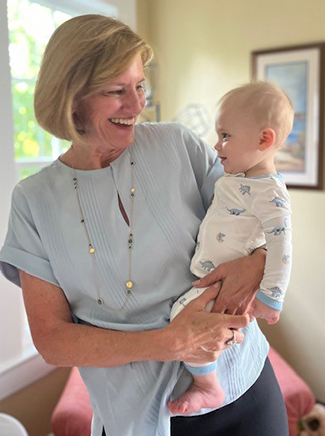
It's a nice gesture. It’s also a ploy.
“I’ll call and say, ‘Can I get you breakfast this morning?’” said Klotman, who was recently reappointed to her second five-year term as dean, vice chancellor for health affairs at Duke University, and chief academic officer for the Duke University Health System. “I used to tell myself I was going over to help, but it’s mainly just so I can see JP. It works.”
After the last few years — when the already demanding work of overseeing an institution as large and complex as the School of Medicine has been compounded by world affairs that have spilled over into Duke and required enormous attention — seeing her grandson is a tonic.
“He’s one reason I’m still a very optimistic, happy person,” said Klotman. “Especially during the past two years, it’s easy to get so caught up in things that it becomes all-consuming. It’s hard to step away and unwind. JP came along at just the right time. There’s so much going on in the world, and seeing a new baby is like magic. And that’s wonderful, because it’s been a strange couple of years.”
Guiding Principles
Certainly no one could have foreseen what lay ahead when Klotman took office on July 1, 2017. A Duke alumna several times over — she received her undergraduate and medical degrees at Duke, completed a fellowship in infectious diseases, and joined the faculty — she was appointed to her current roles after serving for seven years as chair of the Department of Medicine. Prior to that, she built a prominent career as a researcher and leader studying HIV at the National Institutes of Health and Mount Sinai School of Medicine (now the Icahn School of Medicine at Mount Sinai) in New York.
Klotman began her tenure as dean with two guiding principles.
The first was “One Duke”: the idea that the most progress can be made through active collaboration and cooperation by everyone in the Duke community, regardless of department, discipline, title, and all the other distinctions that so often tend to silo efforts.
The second was a commitment to service in support of faculty, students, and staff to ensure both their individual success and that of the School of Medicine in meeting its missions of excellence in research, education, patient care, and community partnerships.
She was two and a half years into her tenure as dean, leading multiple key priorities — enhancing Duke’s big data and artificial intelligence capabilities, building cross-disciplinary collaborations, and expanding the scope and footprint of Duke’s research enterprise, among many others — when the pandemic hit.
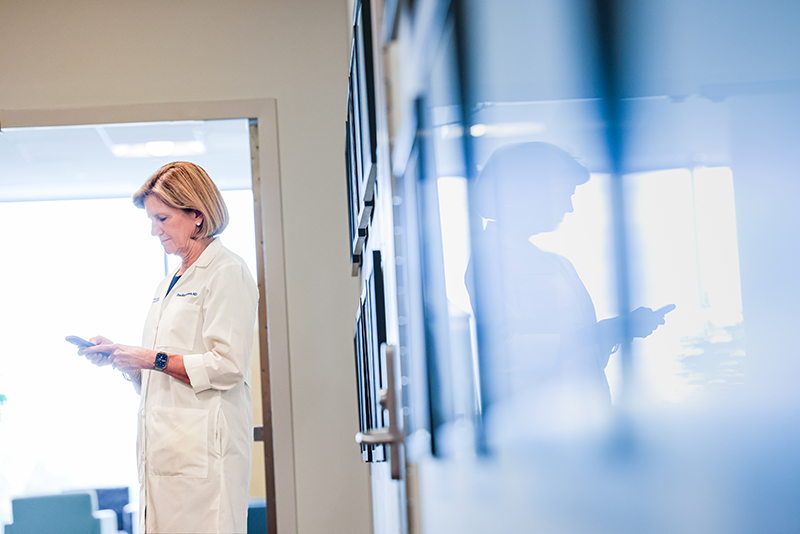
‘Everything Was Going to Change’
Klotman had kept tabs on reports about the mysterious viral disease that appeared in late 2019 in China and began to spread. But, as it did for most people, COVID-19 seemed to happen slowly, and then all at once.
“I remember when I knew everything was going to change,” she said. “It was early March. I was at Penn, where I had just done a visiting professorship, and that afternoon they suddenly announced they were closing their campus. I was getting a lot of calls from Duke. I flew back right away, and we were shut down.”
She promptly organized a crisis team, composed primarily of the vice deans who oversee the School of Medicine’s mission and administrative functions and teams, including basic science, clinical research, medical education, finances, and communications. The team met every morning at 7:30 to assess the latest developments, brainstorm strategies, formulate plans, and coordinate with leaders from Duke University and the Duke University Health System.
“There was no playbook,” Klotman said. “But everybody was extraordinary every single day. They came to the table with ideas, with humor, with offers to help, and with incredible camaraderie. There was never any territorial behavior. Nobody cared about taking credit. And I have to say, we had very few missteps. I was very, very pleased. And lucky.”
The School of Medicine and Duke University Health System, along with the entire university, became nationally known for their effective and efficient pandemic response, establishing a model for how to keep a major academic health care institution operational in meeting its basic missions, but also essential as a testing, treatment, and ultimately vaccination hub for the community and region.
“We’re trying to intentionally learn from that experience and change policies and processes for the better,” Klotman said. “We learned how to get clinical trials up and running faster, for example, but it could have been even faster if we had a national database. The pandemic highlighted the need for a comprehensive, coordinated public health infrastructure. We cannot rely on the infrastructure we have now in crisis after crisis. And one problem we clearly haven’t solved is the willingness of people to believe misinformation. That was astounding to me. We need to be better communicators. We need to better understand the social science of communication and partner much more effectively with communities to improve public health and counteract misinformation.”
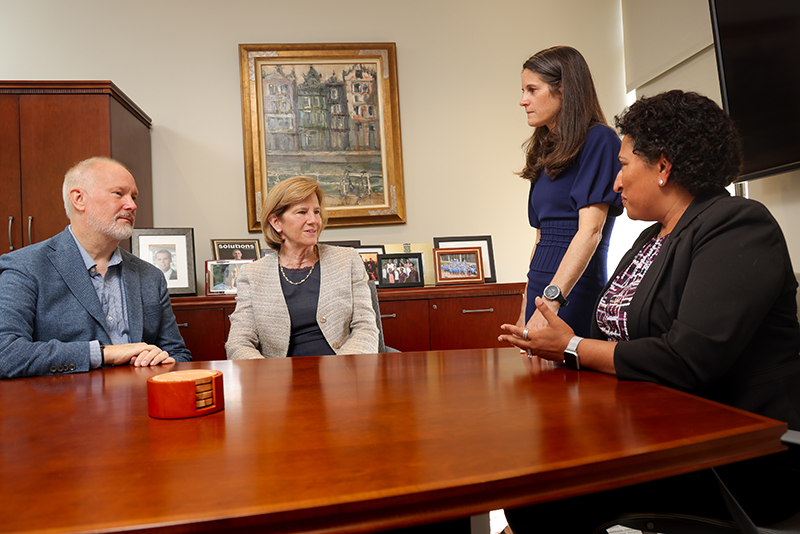
A New Model
Over the past few years, Klotman, along with leaders from across Duke Health, delivered on another important strategic plan outlining the future of Duke’s clinical enterprise. One far-reaching aspect of the plan called for the restructuring of Duke’s clinical practice. A key element of the plan was the creation of a new model for care.
In May, the members of the Private Diagnostic Clinic (PDC) voted in favor of moving forward with the integrated practice, and now the work is under way. The Duke Health Integrated Practice will bring the PDC — historically a separate, independent entity — into closer alignment with the school and health system to fulfill a shared vision for health care.
“This work required everyone to come together and agree to move forward in a new way,” Klotman said. “Our goal is to ensure that Duke Health is well-positioned for the future and can continue to provide the best care for our patients, be the best employer for our physicians, providers and staff, and ensure that we can support our academic missions.”
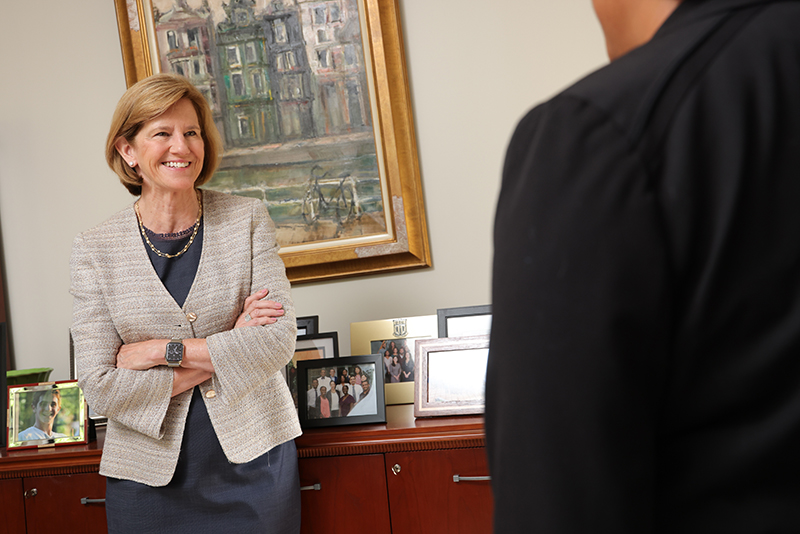
Focus on the Priorities
As she begins her second term, Klotman is committed to maintaining momentum on the major projects begun on her first watch, including the Duke Health Integrated Practice, and the new “Patient First” medical education curriculum, which gives medical students the opportunity to interact with patients from their very first weeks on campus.
“We’re going to be laser focused on constantly looking at what we’ve accomplished and evaluating what we need to do,” she said.
One important area of emphasis will be continuing to support the school’s research community. The School of Medicine is a leader in Duke’s new Science and Technology (DST) initiative, which aims to attract top scientists to Duke to complement current faculty already conducting innovative research in areas including cancer, neuroscience, and immunology.
“Our emphasis with DST is on recruiting and retaining faculty members with the expertise and innovation that distinguishes Duke as a national leader,” Klotman said. “These are areas where Duke is in a position to make transformational advances, and we are committed to building on those strengths.”
Among Klotman’s other priorities is doing a deep dive into wellness among the School of Medicine’s workforce and student population. Health care can be a stressful line of work even in the best of times, and the pandemic ratcheted the stress level for many health care professionals into the burnout zone. And students and researchers are hardly exempt.
Klotman wants to institute new systems and processes to evaluate, monitor, and enhance the wellness — physical as well as emotional — of the entire School of Medicine community.
“The pandemic has been an extraordinary stressor, but even before that there were warning signals,” she said. “I think this is an area where none of us — meaning health organizations across the country — have really come up with the solution. To my mind, there’s nothing more fulfilling and engaging and inspiring than health care, education, research, and community engagement, and we need to figure out how to instill that excitement and sense of purpose in everybody who works here. And I think that comes down to ensuring that everybody feels like a valued and important part of our mission. I want to take a coordinated approach to understand what needs to be addressed and see what really works.”
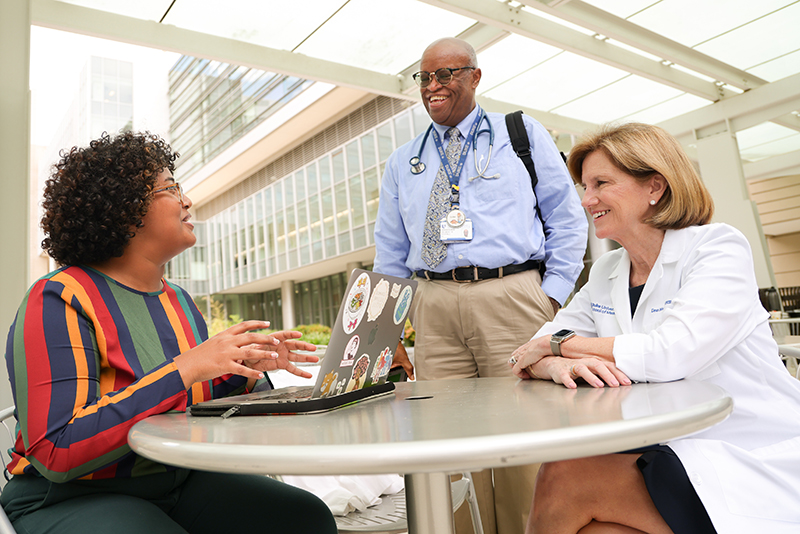
What drives Klotman is her commitment to leading efforts to help the School of Medicine fulfill its missions and make a difference in the lives of people in the local community, the region, and across the world.
“There are always going to be challenges,” she said. “We can always do better. But I’ve learned that despite the challenges, if you focus on the priorities you’ve set and get the right team together, you can have a big impact.”
With every significant event, whether planned or unforeseen, from the pandemic response to the integration of the clinical practice, and many others, Klotman has seen that a commitment to the two principles she set out with — One Duke and service to the School of Medicine community — leads to progress.
“Those two themes have resonated with everything we’ve done,” she said. “Look at our COVID response. We navigated that successfully because everyone worked together for the common purpose of fulfilling our missions while keeping people safe, and because everyone stepped up to serve in some capacity, including serving the community. I was incredibly proud of our faculty, staff, and students. And they have continued to show the same spirit over and over ever since.”
Dave Hart is the director of editorial services for Duke University School of Medicine’s Office of Strategic Communications
Photos by HuthPhoto
